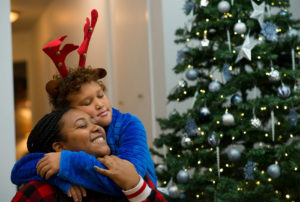Why You Want Your Child to Challenge You: Flipping the Script on Children’s Challenging Behavior

November 2nd
2023

Parenting is often called the hardest job in the world, and in this case, it’s earned its reputation! Our kids can push our buttons in so many ways that we often feel victorious when they don’t! But did you know that there are also many reasons to celebrate those times when your child gives you a hard time? This week, we’re flipping the script for all parents and co-parents out there and putting a positive spin on children’s behavior. Read on to learn more about how challenging you can be a good thing for your child.
The Gist
Testing The Limits of Parental Sanity:
Do you aspire to raise an independent thinker, one who asks questions about why things are the way they are? One who has the strength of conviction to trust his instincts rather than go along with the crowd? One who can assert herself and stand up for what’s right? Most parents would agree that this is their ideal for their child.
However, those “desirable” qualities become problematic once kids use them against their parents. Perhaps they scream “No,” when asked to do something, or insist on doing things themselves, or always ask “why.” Perhaps they even defy commands, or unload a torrent of negative emotions onto their primary caregivers. And suddenly, we’re not so sure about that whole “independent thinker” concept!If you’ve found yourself in this scenario, rest assured that you’re not alone! Children’s challenging behavior can take numerous forms, and when it occurs it’s often directed at those closest to them. It can make us feel frustrated, furious, and like we’re failing.
The reasons we struggle when our children test us can include:
Fear: Anger is often a secondary emotion that masks something else. In this case the “something else” might be fear. It’s scary to think you don’t have the power to prevent your child from making poor or unsafe choices. As parents, it’s instinctive for us to worry about their wellbeing.
Our own upbringing: Our past experiences with our own caregivers serve as a model and shape our own parenting. We often internalize their style and reenact it with our children. In previous generations, a common parenting approach was to prioritize respect for elders and adherence to their instructions without exception. If your parents hailed from this era of “unquestioning obedience,” (and many of ours did!), you may find yourself expecting your kids to listen to you “just because I said so!”

Judgment from others: As a culture we often talk about how hard parenting is, but at the same time we are also quick to pass judgment. Some parents may feel that their child’s behavior is a reflection of their competence and worry that others will judge them when their child acts out. They may also be concerned about how their own parents will perceive their parenting style (especially if it’s different or more “tolerant” of challenging behavior).
Stress/Parental Burnout: When our nerves are frayed or we are going through a stressful period (such as a separation or divorce… co-parents, we’re talking to you!), it’s harder to find the patience for our kids’ outbursts or button-pushing. We have fewer reserves in our tank to provide them with emotional support.
Parents are humans, too, and to have all this combative energy thrown at us by our children can be exhausting! But in the long run, it can be even more exhausting and disheartening to view it as willful trouble-making. Behavior is communication, and when we personalize our children’s actions as attacks against us, we can lose the messaging behind it. We can get locked into our own emotions and fail to respond with the wisdom and empathy that our kids so desperately need. A mindset shift can pull us out of this frustration and save our sanity. Let’s explore ways to reframe our parenting difficulties into parenting wins.
The Positives of Problematic Behavior:
While it may give us a few gray hairs along the way, children’s challenging behavior can serve a purpose. Here’s why:
- Testing boundaries is a natural, necessary part of children’s development. They have to explore their environment, make mistakes, and push the limits in order to learn what’s expected of them.
- We are a safe place for our children to explore and unravel. If your child feels comfortable giving you the worst version of himself, you may have cause to pat yourself on the back; this can be a sign that your child feels secure in your unconditional love. Kids often have to hold themselves together in other environments- like school, sports, social events- and they need a place to unload all the pent-up feelings from their day. In the end, most of us would rather our children test the rules or unleash an epic tantrum at home rather than in any of those other settings.
- Curiosity is a sign of intelligence. Asking questions shows cognitive intellect. Kids can acquire valuable knowledge by questioning what we do and say and this can serve them well in other endeavors (school, future career, etc.).
Children gain valuable life skills by telling us “No,” asking “Why,” or otherwise doing things that might be considered “difficult.” Examples include:
- Skills of inquiry: As we mentioned earlier, the ability to ask questions to make informed decisions comes in handy in academic and social arenas. You could be raising a future scientist, researcher, or investigative reporter!
- Independent thought: Kids who can form their own opinion and stick to it become independent-thinking teenagers and adults who can stay true to themselves without falling victim to peer pressure or other (potentially negative) influences.
- Assertive communication: The word “no” often triggers parents. But when kids can learn how to state their preferences and boundaries respectfully, they become assertive communicators. This communication style can serve them well in personal and professional situations. Remember this next time your child yells “no;” the little girl who stands in front of you refusing to clean up her toys may grow into an adult who stands her ground (for example, when someone violates her physical space or asks more than she is willing to give).
- A sense of competence and confidence: As children share their opinions, wants and needs, and feelings, they learn the power of their own mind and voice. As they have more opportunities to actually think and do things for themselves, they gain competence and confidence in their own abilities.
- Intrinsic motivation: The “because I said so” mentality may work for many children, in the moment; the sheer force of their parents’ will persuades them into compliance. But what happens when their parents aren’t around? Do they still internally understand the value of the behaviors their parents were trying to instill in them? Some kids who grow up in “authoritarian” households end up rebelling against the rigid rules when they get older, or don’t know how to make appropriate decisions once they’re on their own. On the other hand, children who have been able to share their perspectives and have a voice find their motivation from within.
NOTE; It’s important to recognize that not all challenging behavior is created equal, and you know your child best. If your child’s behavior is causing harm to self or others, has persisted for longer than a few weeks, and/or is impeding day-to-day functioning, we encourage you to seek more intensive support. You could consider contacting your child’s pediatrician, school counselor, or other professionals such as a child therapist or psychologist.
Flipping the Script: Embracing the Challenge
By now you might be wondering, what’s the alternative in all this? How can we view our children’s behavior in a positive light while still teaching them what’s appropriate? Years of research suggests that kids often need their parents to take charge and provide them with structure and rules in order to feel safe and be successful. We’re not suggesting that you do away with any of that!
The difference lies mainly in your mindset and where you place your focus. Aim to meet your child’s resistance or questioning calmly, validate and even encourage their opinions, while holding firm to the boundary you’ve set for them.
To summarize, this approach could look as follows: “You’re very angry that it’s bedtime. It’s hard to stop playing when you are having so much fun! It’s ok to be angry and it’s ok to tell me when you are! Your body needs rest in order to be able to learn and play. It’s bedtime now. I am going to help you into bed and tuck you in.”
If you’re looking for a more detailed explanation of how to do this, we’ve created a guide for you! Check out: FLIPPING THE SCRIPT: ALTERNATIVE WAYS TO ADDRESS CHILDREN’S CHALLENGING BEHAVIOR where we’ll walk you through the process.
Challenging Behavior: A Common Issue for Co-Parents:

Our positive reframe for children’s negative behavior can be life-changing for parents everywhere. It can also be especially useful for co-parents. Here’s why:
- Your children may test the boundaries as they are adjusting to your separation or divorce. Transitions or times of change can be difficult for children; they may feel unsettled and unsure of what to expect. During these periods, they try to understand what’s different and what’s the same by pushing limits or challenging their parents’ rules.
- Your kids may be processing varied feelings throughout the co-parenting experience. They may be more prone to meltdowns, tantrums, or explosive expressions of emotions. Sometimes the reasons for these outbursts may be obvious, while at other times they may be triggered by things that seem, to you, relatively minor.
- Your children may engage in power struggles with you. Kids don’t often have much of a say in what happens when their parents separate, and so they may try to find control in other areas.
- Your kids may play one parent against the other; they do this not to intentionally manipulate them but rather to get their needs met. Kids are very quick to figure out how each parent will respond to specific behaviors and then act accordingly. For example, they may try to extend bedtime with whomever is more lax with routines. Or, they may tell one parent that the other one gave them permission for something when that wasn’t the case- as in, “Daddy told me I didn’t have to go to soccer anymore.” This happens even in situations where both caregivers are still together, but can be especially pronounced in co-parenting families. As they try to figure out the new dynamics of their family, they may engage each parent in a battle to win their affection (through gifts or giving in to their demands). They may be more likely to get away with giving misinformation to their parents, since they’re no longer living together and aren’t always able to communicate about what’s going on.
These behaviors can be extremely taxing on co-parents at a time when you’re already very stressed. But they are also very common and often healthy reactions to a major life transition like parental separation or divorce. Our strategies aim to normalize your children’s challenging behavior and prepare you for what to expect so that if and when it happens, you can stay calm and respond in an empathetic, supportive manner. You may even strengthen your relationship with your parenting partner in the process!
Today’s Challenging Children Can Become Tomorrow’s Change-makers:
We’ve armed you with a fresh way of looking at some of parenting’s greatest challenges. Next time your child acts out, we hope you and your parenting partner will take a step back and view the moment with a wider, more forgiving lens. You may be getting a defiant stare-down from your child today, but with your love and support that little person can grow into a strong, fearless force of nature with the power and confidence to change the world.
We’re turning one! Come celebrate with us as we recognize the first anniversary of Koh-Parenting’s blog! Next week, we’ll take you on a journey, from the origin of Koh-Parenting, through the past year of our blogging adventures.


Loading
Thank you for joining our
Koh-Parenting Community!
We are registering your email address. Please don't leave this page. You will be redirected in less than 10 seconds.
To continue reading this blog, join our community!
When you join our community you will keep you in the loop on the latest co-parenting topics, our weekly Newsletter, company updates and happenings. We will be here every step of the way as you embark on a developing a healthier co-parenting relationship.
Latest Posts

We’ve Just Separated; Now What?” Series, Part II: Defining the New Relationship
What happens to the dynamic between two people when a relationship ends? After a breakup, many people completely remove [...]

We’ve Just Separated; Now What?” Series, Part I: What is Co-Parenting?
Are you stepping into 2024 as a newly minted co-parent? You’re not alone: statistically, the first Monday after New Ye[...]

Giving Back to YOU: Why Celebrating Your Co-Parenting Wins is the Ultimate Gift to Yourself
When was the last time you celebrated yourself? Many people spend the last few weeks of the year running around, buying [...]

KohParenting’s Top 3 Holiday Spending Pitfalls, Solved!
The ads are everywhere: ‘tis the season for spending! Retailers big and small all jump on the bandwagon at holiday tim[...]

7 Ways Single Parents Can Manage Holiday Stress
Any parent knows that the holidays can be full of both magic and mayhem. For single-parent families, the period from Tha[...]

Raising Kind Kids: World Kindness Week!
Kindness isn’t just a world; it’s a movement. Did you know that November 13th -19th is World Kindness Week? People f[...]

Celebrate With Us: A Year of the Best in Koh-Parenting Content
Co-parenting is one of the most challenging roles anyone could possibly undertake, and it’s important to celebrate all[...]
